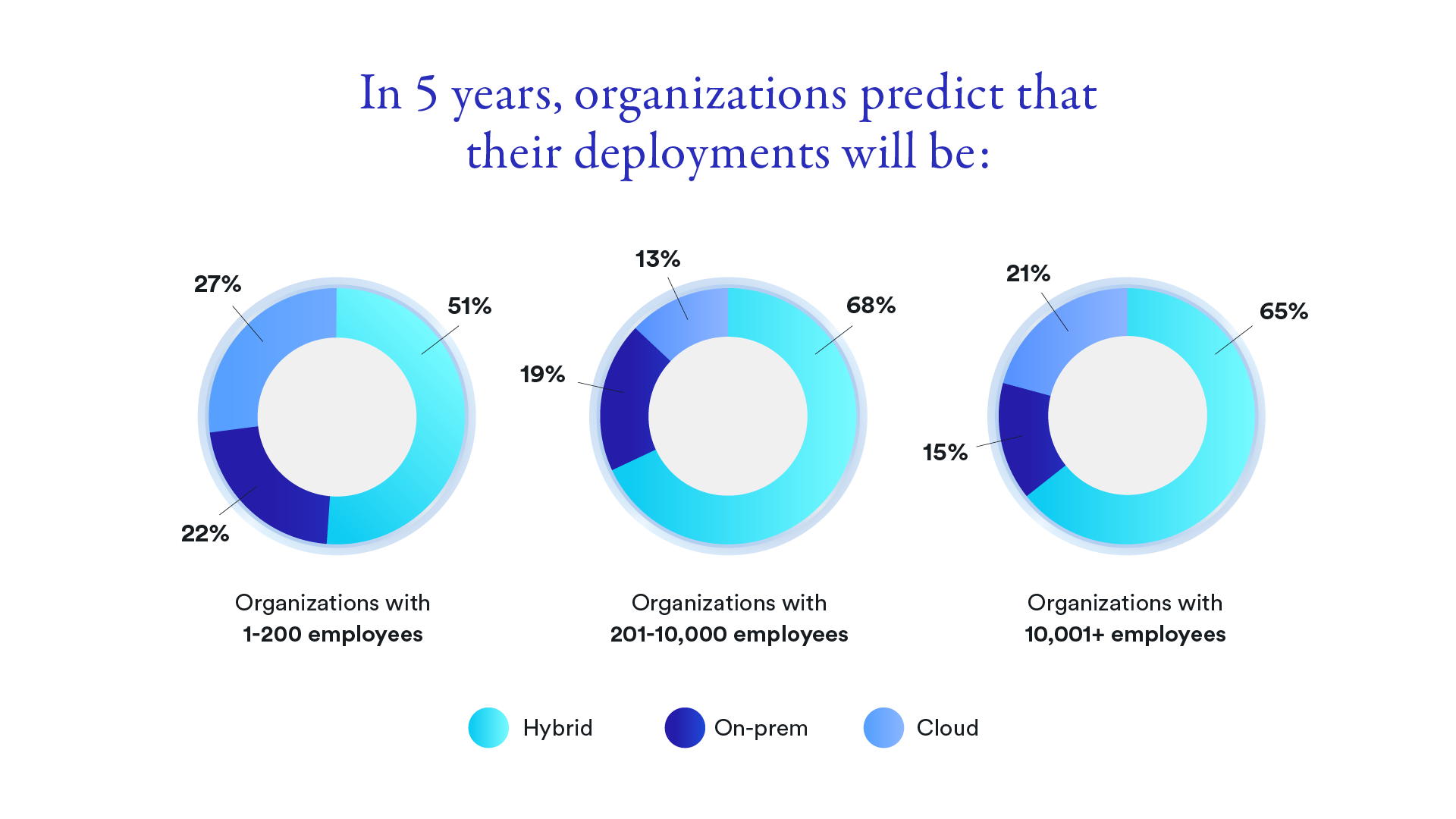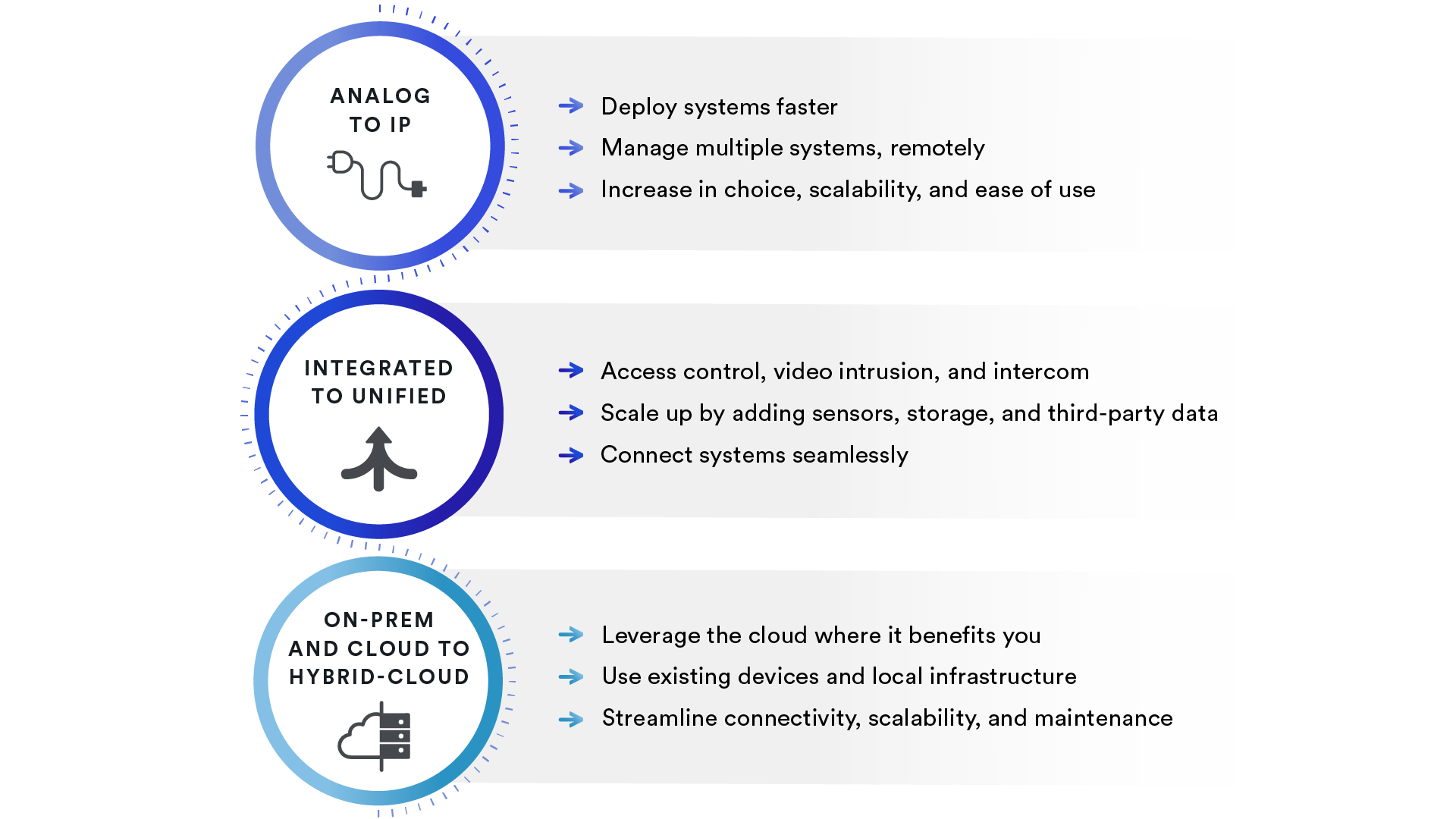What you should know about cloud solutions and cybersecurity
Learn how a cloud-based physical security solution can help your team achieve higher levels of cyber resilience across your organization.

According to the 2024 State of Physical Security report, 31% of respondents confirmed that their organization was targeted by cybercriminals. In response to these threats, 42% of organizations increased deployments of cybersecurity-related tools in their physical security environments. That’s a 29% increase from the previous year.
Investing in new cybersecurity mechanisms isn’t the only way to strengthen your security posture. Organizations are also implementing zero-trust strategies and turning to cloud-based physical security solutions to help mitigate risks and address cybersecurity gaps.
IT professionals are also advocating for cloud-first or hybrid-cloud policies organization-wide. Overall, there’s less concern about the cloud being unsafe. There’s also a better understanding that choosing the right cloud vendor can drive cyber resilience up and costs down.
Find out how shifting to cloud-based solutions can help you strengthen both physical and cybersecurity.
CHECKLIST
How do cloud solutions strengthen cybersecurity?
Today, physical security and cybersecurity are interlinked. One cannot be properly upheld without the other. The right physical security solution can help you secure both people and buildings, with access to built-in tools that keep cyber resilience strong and consistent.
The problem is that securing on-premises systems while maintaining cybersecurity best practices can require a lot of extra work, and among various people, requiring different skill sets. Staying on top of software and firmware updates, vulnerability patches, server lifecycles, and maintenance agreements strains budgets and resources.
Keeping up with all this at a single location is hard enough. If you have hundreds of locations around the globe, that can add an extra challenge to maintain all the security hardware while keeping cyber threats at bay.
Watch the panel discussion and learn why Uber, Starbucks, and Barclays are considering migrating their physical security to the cloud:
Cloud services offer you an easier path to cyber resilience because it takes the burden of constant upkeep off your IT and security teams.
Cloud solutions give you access to the latest built-in cybersecurity features, including granular privacy controls, strong user authentication, and system health monitoring tools. And as soon as the latest versions and fixes are available, you can have them pushed immediately to your system. This helps your physical security systems remain protected against vulnerabilities.
Having cloud services in place eliminates the need to rely on paperwork or spreadsheets to make sure all your system components are updated and hardened. Your team can benefit from higher levels of automation to get cybersecurity tasks done. By having all your systems connected, you can be notified when a vulnerability is affecting one of your components. And once a newly updated version is available, you can easily access and deploy it to mitigate that vulnerability as soon as possible.

BLOG
3 ways cloud solutions enhance your cyber posture
Maintaining cyber hardening with your technology vendor |
When you partner with a trusted cloud technology vendor, you share the responsibility of ensuring that your solution is cybersecure. Your partners can have dedicated teams who work around the clock to proactively mitigate potential vulnerabilities and ensure your cloud solution is hardened against threats.
This means you don’t need specialized teams or IT resources designated to handle these tasks. Your physical security team can focus on day-to-day operations while knowing cybersecurity experts are handling hardening and risk mitigation in the back end.
BLOG
Establishing data sovereignty and redundancy |
The right partner will have many different data center locations to choose from. This allows you to retain control over where your data is stored and processed. No matter where your systems are located, you can adapt each system’s settings to meet local compliance regulations all from one cloud-based platform. This ensures that you establish data sovereignty depending on local data protection laws.
Part of data governance is to set up rules for when video or data need to be kept, and to decide for how long, along with automating file deletion. You can also store multiple copies of video or data in different data center locations. This adds redundancy and helps with disaster recovery. And cloud-managed appliances can be used for local storage while adding longer-term archives in the cloud.
Evolving cybersecurity with your channel partner |
Your channel partners such as system integrators, consultants, and technology partners are also given tools to remotely monitor your system’s health. Having access to this information can help them identify opportunities to enhance your cybersecurity even further.

This might include adding new integrations or tools, providing specialized training, or customizing other measures that would benefit your specific deployment. They can help guide your team in strengthening compliance with industry and regional regulations. All this extra support goes a long way in keeping threats at bay.
How safe are cloud-based physical security solutions?
Cloud-based physical security solutions allow you to host your systems, applications, or video recordings on servers that are located in data centers all over the world. And while it’s normal to speculate whether your data and systems are protected, the cloud can be a lot safer than many on-premises systems.
More and more organizations are catching on to this fact. Teams aren’t as worried about the cybersecurity risks of cloud solutions as they once were. According to the 2024 State of the Physical Security report, attitudes are changing fast as concerns over cloud security fell from first to sixth place in one year.
That’s because tier-one cloud service providers such as Microsoft Azure, Amazon Web Services, and Google Cloud Platform invest significant amounts of time and resources in ensuring the highest levels of cybersecurity.
These major platform owners have teams and consultants dedicated to monitoring the latest cyber threats and initiating regular third-party penetration testing and auditing. They also actively uphold various cybersecurity compliance standards and certifications, and push the boundaries of cyber resilience to help establish globally-adopted best practices.
By choosing a physical security solution built on one of these top-tier cloud platforms, you’re entrusting this due diligence to cybersecurity experts.
The major shifts in physical security

Consider the flexibility of a hybrid-cloud deployment
Thinking about moving to the cloud but not ready to transition to a full-cloud deployment? Choosing a hybrid-cloud model is the best option. This gives you the freedom to move some system components over to the cloud while keeping others on-premises, and varying your deployment across sites.
All your system components, whether on-premises, at the edge, or in the cloud, can connect back into one centralized and intuitive cloud-based platform. This allows your operators to easily manage security across all your sites and maintain cybersecurity best practices.
You can also swap out older proprietary NVRs for cloud-managed appliances to easily connect existing devices to your cloud-based platform. This helps to quickly modernize deployments while keeping some existing investments. And firmware and cybersecurity updates are automatically pushed to these devices, strengthening cybersecurity and eliminating the need to send technicians on-site for maintenance.
EBOOK
Why choosing the right cloud solution matters
Keeping systems safe from threats can be costly and complex. Usually, it requires dedicated resources, large budgets, and relentless diligence.
Having the right cloud solution and technology provider means you can get access to built-in cybersecurity features and tools to automate processes and stay on top of threats. You’ll also get a team of experts working proactively to ensure your systems are always hardened and secure. This lets you focus on what matters most—keeping everyday life and operations running smoothly.
